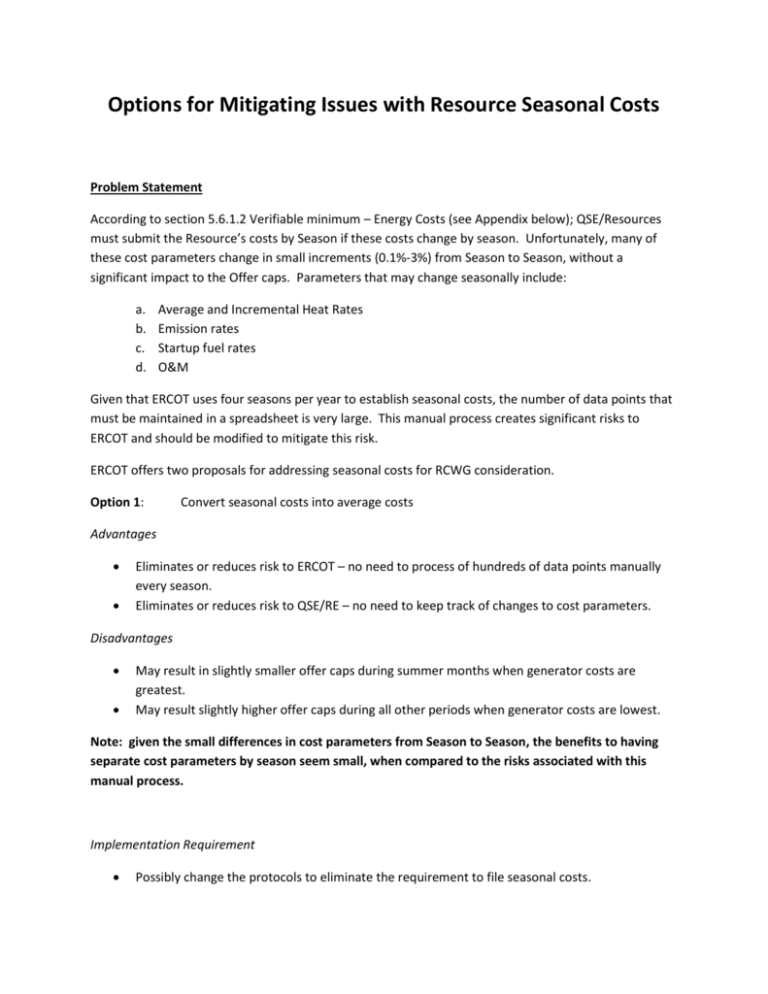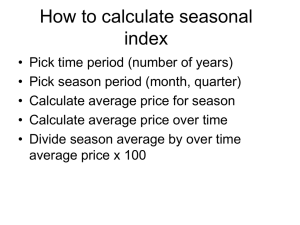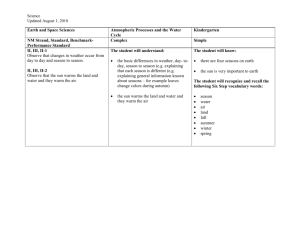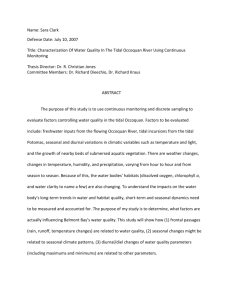Options for Mitigating Resource Seasonal Costs Issues
advertisement

Options for Mitigating Issues with Resource Seasonal Costs Problem Statement According to section 5.6.1.2 Verifiable minimum – Energy Costs (see Appendix below); QSE/Resources must submit the Resource’s costs by Season if these costs change by season. Unfortunately, many of these cost parameters change in small increments (0.1%-3%) from Season to Season, without a significant impact to the Offer caps. Parameters that may change seasonally include: a. b. c. d. Average and Incremental Heat Rates Emission rates Startup fuel rates O&M Given that ERCOT uses four seasons per year to establish seasonal costs, the number of data points that must be maintained in a spreadsheet is very large. This manual process creates significant risks to ERCOT and should be modified to mitigate this risk. ERCOT offers two proposals for addressing seasonal costs for RCWG consideration. Option 1: Convert seasonal costs into average costs Advantages Eliminates or reduces risk to ERCOT – no need to process of hundreds of data points manually every season. Eliminates or reduces risk to QSE/RE – no need to keep track of changes to cost parameters. Disadvantages May result in slightly smaller offer caps during summer months when generator costs are greatest. May result slightly higher offer caps during all other periods when generator costs are lowest. Note: given the small differences in cost parameters from Season to Season, the benefits to having separate cost parameters by season seem small, when compared to the risks associated with this manual process. Implementation Requirement Possibly change the protocols to eliminate the requirement to file seasonal costs. Protocols could remain as is and change the VCM to clarify that seasonal cost will be averaged by ERCOT/Resource/QSE once verified. In fact, this seems a better approach since ERCOT should verify these costs prior to any averages being done. Change the VCM to add procedure for calculating seasonal costs Option 2: Streamline the requirements for seasonal costs; only consider cost differences greater than 5% from season to season. Advantages Eliminates or reduces risk to ERCOT – no need to process of hundreds of data points manually every season. Eliminates or reduces risk to QSE/RE – no need to keep track of changes to cost data. Offer caps during summer months may reflect actual generator costs. Disadvantages Due to the averaging of cost parameters that are less than 5% difference from season to season, it may result in slightly lower offer caps during summer months when generator costs are greatest. Implementation Requirement Change the VCM to clarify that seasonal costs will be averaged by ERCOT/QSE once verified and approved, except for cost differences that are greater than 5%. Change the VCM to add procedure for calculating seasonal costs Note: ERCOT prefers option 1 because most seasonal cost parameters change less than 5% season to season. Carving out a special treatment for seasonal cost that are greater than 5% by season still maintains the risk to ERCOT. Appendix 5.6.1.2 (1) Verifiable Minimum-Energy Costs The unit-specific verifiable minimum-energy costs for a Resource are: (a) Actual fuel cost to operate the unit at its LSL including a fuel adder that compensates for the transportation and purchasing of spot fuel as described in the Verifiable Cost Manual; plus (b) Verifiable or standard variable O&M expenses; plus (c) NIS to operate the unit at its LSL. (2) The QSE must submit the Resource’s cost information by Season if the Resource’s costs vary by Season. For gas-fired units, the actual fuel costs must be calculated using the actual Seasonal heat rate (which must be supplied to ERCOT with Seasonal heat-rate test data) multiplied by the fuel price plus consideration of a fuel adder that compensates for the transportation and purchasing of spot fuel as described in the Verifiable Cost Manual. For coal-and lignite-fired units, the actual fuel costs must be calculated using the actual Seasonal heat rate multiplied by a deemed fuel price of $1.50 per MMBtu. For fuel oil-fired operations, the number of gallons burned must be multiplied by the FOP.






